At the end of February, Uncovered’s head of case research and data, along with Uncovered advisor, Dr. Krystal Hans presented at the American Academy of Forensic Sciences (AAFS) 2022 Conference in Seattle, Washington. The presentation focused on our academic partnership to integrate cold case investigations in forensic science education. AAFS is a multidisciplinary professional organization that has more than 6,000 members in all 50 states, as well as 71 countries. The conference AAFS hosts each year is the largest conference of forensic scientists/professionals in the U.S.

What do forensic scientists do?
The term forensic scientist encompasses many different professions and includes people such as pathologists, attorneys, dentists, toxicologists, anthropologists, entomologists, document examiners, digital evidence experts, psychiatrists, engineers, physicists, chemists, criminalists, educators, researchers, and others.
The AAFS conference brings all of these professionals together to present the most current information, research, and updates in this rapidly changing profession. At this year’s conference, over 1,000 scientific papers were presented via oral presentations, poster sessions, workshops, and breakfast/luncheon seminars.
The team spent a lot of time with entomologists and, if you like bugs, they are your people. Forensic Entomologists apply the study of insects to criminal investigations and legal cases. These scientists can estimate the postmortem index, any change in position of the corpse as well as the cause of death.
Cold cases and student forensic science work
This year, Uncovered, along with Dr. Krystal R Hans from Purdue University, gave a presentation on “Integrating Cold Case Investigations in Forensic Science Education: Student Engagement in Research, Information Literacy, and Data Visualization.” The goal of this presentation was twofold: 1) to educate attendees on the importance of cold case investigations and the incorporation of forensic science educational strategies in these investigations and 2) to impact the forensic science community by presenting a forensic science educational tool and a developing database of cold case information, that incorporates the work of students, forensic scientists, law enforcement and citizen detectives.

Currently, Uncovered is working with four universities, Purdue University, Arizona State University, Cal Poly, and John Jay with the hopes of expanding more. The curriculum has been developed and is currently in use at Purdue and Arizona State. We have several other institutions that have also expressed interest in bringing this class to their students.
In a collaboration between Uncovered and Purdue University, students in forensic science courses are completing projects on cold case investigations to participate in research, critical thinking assignments, and information evaluation. The concepts of research, information literacy, and data visualization are highlighted in the student projects, and students learn about the ethical concepts of digital detective work, the value of collective impact, and the importance of inclusive victimology. Students are assigned a cold case, watch videos and hear lectures from Uncovered and participate in group research to develop a comprehensive overview of the people, timeline, locations, sources, tips, and theories related to the case and the investigation. Students participate in group and class discussions, complete assignments, and reflection surveys throughout the semester. The culminating deliverable is the production of a detailed case spreadsheet, as well as an infographic to display all pertinent information about the cold case and investigation. Data on student learning, thematic analysis of information sources, and student experience are collected from reflection surveys and interviews.
We hope that through our partnership with Purdue and other universities, we are able to develop a sustainable framework of student and community involvement. This research and collaboration provide opportunities for new avenues in forensic science education, preparing students professionally with the incorporation of real-world experience and engagement with the greater law enforcement and forensic science community. Additionally, this also provides a real-world application for students to see the impact of their work directly.
Want to listen to a recording of our presentation? Follow this link to listen to the audio recording.
Interested in working with Uncovered in your classroom?
Uncovered works with educators across all disciplines; most recently: forensic science, journalism, and criminal justice. Are you an educator who would like to learn more about programming or an acedemic partnership? Let’s connect.
